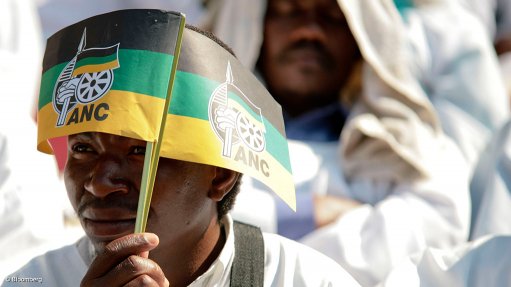
Photo by: Bloomberg
The African National Congress (ANC), which has been governing South Africa since 1994 thanks to successive large electoral majorities, is expected to dip below the psychological barrier of 60% support for the first time during this year's general elections.
The ANC's biggest political opponents, the Democratic Alliance (DA) and Economic Freedom Fighters (EFF), will have mixed results. The DA will be disappointed in its loss of support, while the EFF – although it grew – did not show the exponential growth many predicted. And the Freedom Front Plus will almost triple its support.
According to News24's statistical analysis, based on available and representative results, the country's biggest parties will secure the following (2014 results in brackets):
- ANC: 57.1% (62.15%)
- DA: 21.7% (22.23%)
- EFF: 9.7% (6.35%)
- IFP: 3.5% (2.40%)
- FF Plus: 2.8% (0.90%)
These results make provision for a 1% margin of error.
The biggest drivers of the overall result are low voter turnout, predicted to be around 64% nationally, enormous turnout in suburban areas and low voter turnout in townships and rural areas.
According to News24's election analyst Dawie Scholtz the ANC's drop below 60% is due to significant shifts in the northern provinces among black voters, as well as a dramatic swing away from the party on the southern coast of KwaZulu-Natal.
The ANC's tally of 57.1% represents a dramatic drop in support of more than 12 percentage points since the party's high-water mark under former president Thabo Mbeki in 2004, when the party enjoyed electoral support of 69.69%.
The portents were there, however, when the party's popular support in the municipal election of 2016 collapsed to 54%. It also lost control of three metropolitan municipalities.
Scholtz says it is clear from the numbers that the ANC's losses represent gains by Julius Malema's EFF.
This is evidenced by ANC losses among black voters in most northern provinces and three coastal regions (2014 figures in brackets):
- North West 75% (81%)
- Mpumalanga 80% (87%)
- Gauteng 76% (80%)
- Western Cape and Eastern Cape combined 82% (85%)
- KZN South Coast and eThekwini and surrounds: 73% (85%)
Scholtz believes the performance on the KZN South Coast as well as eThekwini and surrounds did the most damage to the ANC because it is considered a stronghold of the party and also because there are more than 2.5m voters in the area.
Voter turnout dropped markedly, retreating from 78% among black voters in 2014 to 73% in 2019.
Conversely, the EFF fared well in the places where the ANC lost support. In the northern provinces, the EFF will end up on (2014 figures in brackets):
- North West: 15% (10.6%)
- Mpumalanga: 12% (6.4%)
- Gauteng: 15% (11%)
- Western Cape and Eastern Cape: 8.0% (4.7%)
- KZN South Coast and eTthekwini and surrounds: 10% (2.5%)
The EFF's increase on the KZN South Coast – an area that former president Jacob Zuma dominated for the ANC in years past – is one of the "biggest drivers" of the outcome of the elections, says Scholtz.
The DA's losses are almost all due to Pieter Groenwald's FF Plus eating into the support of Mmusi Maimane's DA.
Among the electorate in suburbs of the northern provinces, the FF Plus has increased its share from 4.6% in 2014 to 14% in 2019. The DA, by the same token, has lost support, dropping to 64% from 78%.
In the coastal suburbs, mainly Cape Town, the FF Plus has increased support to 4% from a negligible base.